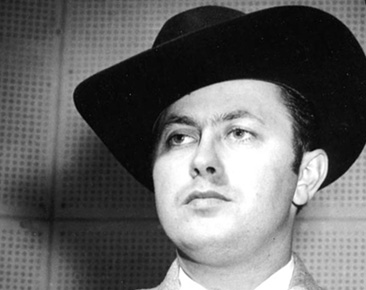
On May 14, 2005, Jimmy Martin passed away.
Ten years ago today, James Henry Martin passed away in Nashville, Tennessee, having been diagnosed with bladder cancer over a year earlier. He was aged 77.
The Toronto Star called him “one of the greatest vocalists in bluegrass.”
Martin was born on August 10, 1927, in Sneedville, in the Cumberland Mountains of east Tennessee.
His mother and stepfather, who used to sing Gospel music, were his first influences and he followed their example by singing in church and with friends from surrounding farms.
As a teenager Martin fell in love with Bill Monroe’s music and this led to him acquiring a guitar, learning basic chords from a neighbor before teaching himself thereafter.
In December 1949 he joined Monroe as part of the Shenandoah Valley Trio, then the opening act for the Blue Grass Boys, to whom he eventually graduated when Mac Wiseman left the group. This first stint lasted until June 1951.
Martin’s high voice mixed with Monroe’s tenor voice came to be known as the “high lonesome” sound. Martin sang lead on several classic recordings, some coming from a later spell with Monroe (July 1952 through to 1954), these included Uncle Pen, Memories of You, Letter From My Darling, On and On, The Little Girl and the Dreadful Snake, Sitting Alone in the Moonlight, Memories of Mother and Dad and I’m Blue, I’m Lonesome. Martin was part of the Shenandoah Valley Trio that recorded four songs for Columbia Records.
 In between those spells with Monroe, Martin teamed up with Bobby and Sonny Osborne, with whom he stayed for about a year. They recorded four songs for King Records in August 1951 and six more – for RCA Victor – in November 1954.
In between those spells with Monroe, Martin teamed up with Bobby and Sonny Osborne, with whom he stayed for about a year. They recorded four songs for King Records in August 1951 and six more – for RCA Victor – in November 1954.
In the spring of 1956, Martin signed with Decca Records and made his first solo recordings in the May of that year.
The strong rhythm of Martin’s guitar playing sets the tempo instrumentally, backing his own cutting tenor voice and tight trio singing, creating a recognizable sound of his own. Sometimes he had a female high-baritone fourth part (provided by Gloria Belle), and used a snare drum in place of a mandolin to keep the back-beat.
The King of Bluegrass, borrowing from a phrase that Bob Artis used to describe Martin, had fan favorites such as Rock Hearts, Ocean of Diamonds, Hit Parade of Love, Sophronie, Stepping Stones, Tennessee and Widow Maker. Rock Hearts was his most successful recording, peaking at Number 14 in the Billboard’s Hot C & W Sides chart (in December 1958). Widow Maker was his only other Top 20 recording, in February 1964.
Martin made frequent appearances on the Louisiana Hayride and Wheeling, West Virginia’s WWVA Jamboree as well as the Grand Ole Opry, although he was never invited to become a cast member, something that rankled him for the rest of his life. However, as bluegrass festivals gained popularity he quickly became a favourite on those stages.
He is featured on the Nitty Gritty Dirt Band’s iconic triple-LP release Will The Circle Be Unbroken (released in 1972), contributing recordings of the Grand Ole Opry Song, Sunny Side of the Mountain, Losing You (Might Be the Best Thing Yet), You Don’t Know My Mind and My Walking Shoes, and providing a featured voice on the title track.
Martin participated in the recording of Will The Circle Be Unbroken, Vol. II (released in 1989) and Vol. III (2002).
 He recruited numerous stellar musicians, including banjo players J.D. Crowe, Bill Emerson, Vic Jordan, Alan Munde; and mandolin players Earl Taylor, Paul Williams, Doyle Lawson and Herschel Sizemore, all of whom have been very successful in bluegrass music subsequently. Other Sunny Mountain Boys included Sam “Porky” Hutchins, Vernon McIntyre Jr., Clarence “Tater” Tate, Vernon Derrick, Paul Craft, Bill Yates and Ronnie Prevette.
He recruited numerous stellar musicians, including banjo players J.D. Crowe, Bill Emerson, Vic Jordan, Alan Munde; and mandolin players Earl Taylor, Paul Williams, Doyle Lawson and Herschel Sizemore, all of whom have been very successful in bluegrass music subsequently. Other Sunny Mountain Boys included Sam “Porky” Hutchins, Vernon McIntyre Jr., Clarence “Tater” Tate, Vernon Derrick, Paul Craft, Bill Yates and Ronnie Prevette.
After an 18-year association with Decca (later MCA Records), Martin had records released by Gusto before Martin started his own label, King of Bluegrass (naturally) for which he re-packaged many of his old Decca masters.
Martin had an exuberant personality and a famously high-strung temperament, but he was an extremely entertaining stage presence.
Martin was inducted into the SPBGMA Preservation Hall of Greats (in 1986), IBMA Hall of Honor (as the Hall of Fame was called in 1995) and Bill Monroe’s Bluegrass Hall of Fame (1998).
He is the subject of a fan-orientated book, True Adventures with the King of Bluegrass, by Tom Piazza and a film King of Bluegrass: The Life and Times of Jimmy Martin.
On this version of Sophronie Jimmy Martin is assisted by two of the Sunny Mountain Boys, Paul Williams and J.D. Crowe, who recorded the song on February 19, 1958.
Special thanks to Emily Gunter for suggesting this topic for today.








